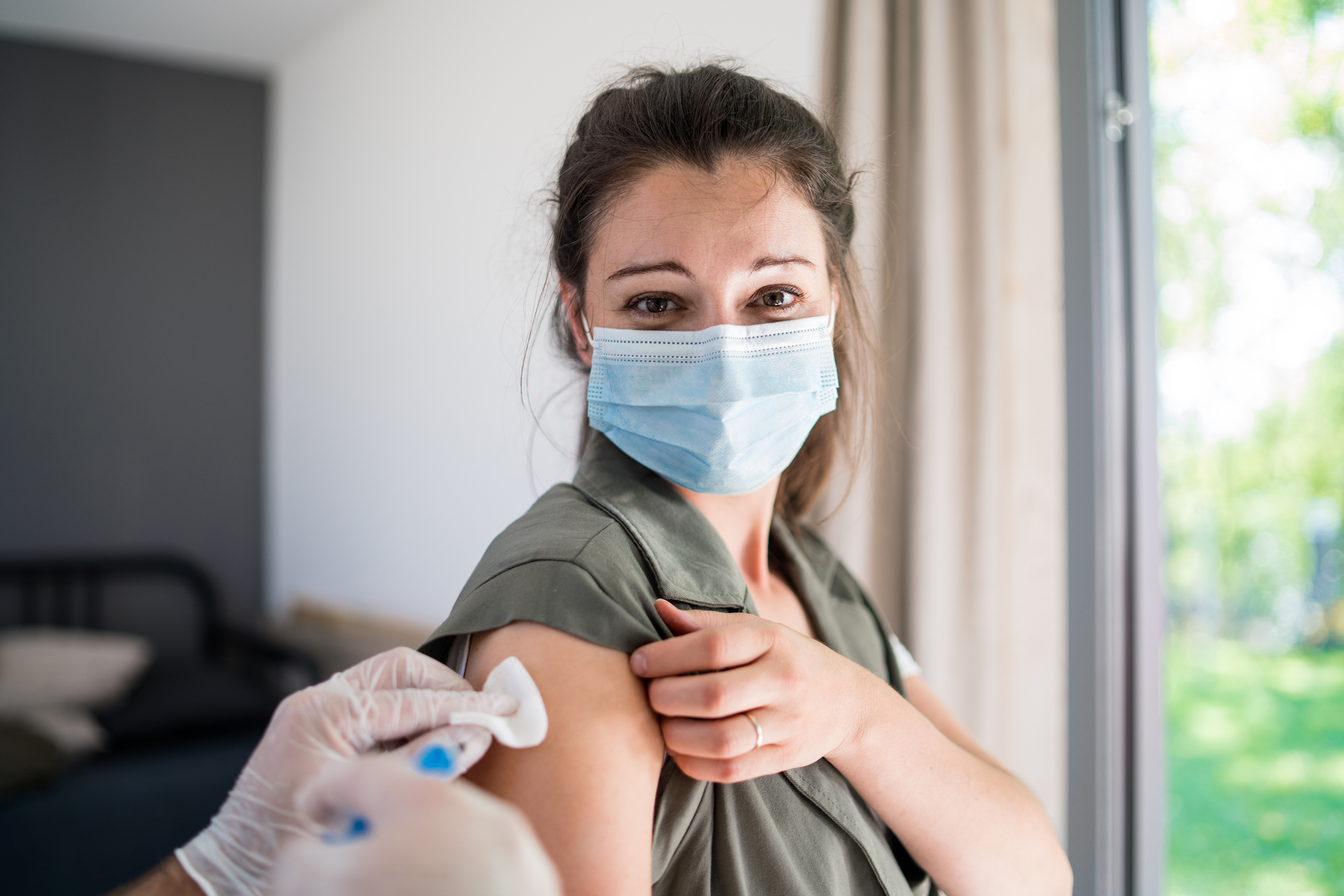So, do you know how long the side effects of the COVID vaccine really last and what they are?
A total of 59.2% of the UK population have been fully vaccinated so far.

A total of 59.2% of the UK population have been fully vaccinated so far.
Fun fact: according to statistics from Our World in Data, 59.2% of the UK have been fully vaccinated so far, and 70.4% of the UK have had one vaccination. To date, that means that in the UK alone, 36.9 million people are fully vaccinated and 86.5 million doses have been given so far.
Globally, 4.46 billion vaccines have been administered, and 1.2 billion people have been fully vaccinated.
Here in the UK, vaccines began to roll out last December, with UK grandmother Margaret Keenan, who was 90 at the time of injection, being the first person in the UK - and the world - to be given the Pfizer Covid-19 jab.
Want to read up on the main need-to-know side effects before you get your jab? There's no harm in being curious, but for those of you who are COVID vaccine complacent, know this: 'the side effects are usually temporary and easy to explain; they are a normal result of your body’s immune system being stimulated to defend itself against the virus,' explains doctor Ioannis Liakas, medical director at Vie Aesthetics.
It's also worth knowing that they are 'nothing like the possible symptoms - and indeed complications - people are seeing as a result of long COVID infection after catching coronavirus', he continues.
Keep reading for an expert-led piece with comments from two doctors on your need-to-knows, or check out our guides to the vaccine and blood clots, the link between fertility issues and the vaccine, and why vaccine misinformation is more likely to harm women than men, while you're here.

Covid vaccine side effects:
How long do covid vaccine side effects last?
The most common side effects of all the coronavirus vaccines are similar and usually short-lived, shares doctor Riz Khan, GP and doctor of nutritional medicine at (med)24.
They typically don’t last longer than a week. Symptoms to have on your radar include:
Marie Claire Newsletter
Celebrity news, beauty, fashion advice, and fascinating features, delivered straight to your inbox!
- A sore, red or itchy arm
- Swelling
- Feeling tired
- Sweating
- Shivers or fever
- Lethargy
- A headache
- Feeling achy
- Nausea
- A temperature.
"These are normal and a sign that your immune system is working to develop a response to the vaccine and subsequently create antibodies to protect you from Covid-19," he explains.
In short, you might experience 'flu-like' symptoms, shares doctor Liakas - if you think about it, you are getting injected with a live virus to enable your body to fight it off. He goes on: "With all three COVID-19 vaccines, around 10% of those vaccinated have generally said complained of ‘flu-like’ symptoms, like the ones outlined above," he shares.
This is the same with most vaccines, he reports. Wondering if you can exercise after your Covid vaccine? Read our expert-led guide.
Although the above side effects are common to all three vaccines, there are some more associated with a specific vaccine.

Pfizer vaccine side effects
According to doctor Liakas, the most prevalent side effects with the Pfizer vaccine are the above flu-like symptom and 'an extended feeling of sickness or swollen lymph nodes'.
However, do note here, there are 'much rarer' at less than 1%.
Another side affect which is even more rare is possibility of developing temporary one-sided facial drooping. "But this is in less than 0.1% of the vaccinated population," explains doctor Liakas.
Astrazeneca vaccine side effects
Next up: the Oxford/AstraZeneca vaccine.
"There has been a small number of reported incidents of unusual bleeding and development of blood clots", shares Liakas. According to the Joint Committee on Vaccination and Immunisation, this has affected around ten people in every million doses of the vaccine.
Moderna vaccine side effects
Last but by no means least, the Moderna COVID-19 vaccine has presented some of the 'rarer' side effects, according to the medical director.
"0.1% of the vaccinated population have developed a temporary one-sided facial drooping known as Bell’s palsy, hypersensitivity, or facial swelling," he shares.

Which Covid vaccine has the least side effects?
According to doctor Khan, this data is not available, so we don’t know this yet.
However, doctor Liakas shares that it depends on a range of variables.
"With the Pfizer vaccine, adverse reactions were reported more by younger people, rather than those over the age of 55 years," he explains.
"On the other hand, the adverse reactions from the Oxford/AstraZeneca vaccine were generally seen by younger people," he shares. "Plus, the strongest association between thrombosis and the Oxford/AstraZeneca vaccine was found between younger people and especially young women."
Do note: as a result, the official advice for women under the age of 40 is still to opt for one of the other vaccines.
Are any of the side effects really severe?
Short answer: mostly not.
There is the rare chance that you could be allergic to the vaccine, but rest assured that anyone administering the vaccine has been trained to handle these situations.
"If people are offered a Coronavirus vaccine, they should take it," explains doctor Khan.
"The vaccines approved for use in the UK have met strict standards of safety, quality and effectiveness, as set out by the Independent Medicines and Healthcare Products, and Regulatory Agency (MHRA)."
What would a doctor's advice be to anyone worried about more severe side effects?
It's important to stress here: all COVID-19 vaccines can prevent serious illness or the risk of dying from coronavirus, warns doctor Liakas.
"Even with the very small number of reported risks of blood clotting problems with the Oxford/AstraZeneca vaccine, the benefits of being vaccinated outweigh any risk, especially for people aged 40 and over who also have underlying health conditions," he shares.
Doctor Khan agrees, saying for any patients that are worried about side effects, he 'reassures [them] that the serious ones are rare and the benefits of taking the vaccine far outweigh the risk.'
Flu-like symptoms lasting for more then three days? Both doctors stress that you should contact your GP, as they may be not related to the vaccine.

Ally Head is Marie Claire UK's Senior Health and Sustainability Editor, nine-time marathoner, and Boston Qualifying runner. Day-to-day, she heads up all strategy for her pillars, working across commissioning, features, and e-commerce, reporting on the latest health updates, writing the must-read wellness content, and rounding up the genuinely sustainable and squat-proof gym leggings worth *adding to basket*. She also spearheads the brand's annual Women in Sport covers, interviewing and shooting the likes of Mary Earps, Millie Bright, Daryll Neita, and Lavaia Nielsen. She's won a BSME for her sustainability work, regularly hosts panels and presents for events like the Sustainability Awards, and is a stickler for a strong stat, too, seeing over nine million total impressions on the January 2023 Wellness Issue she oversaw. Follow Ally on Instagram for more or get in touch.
-
 Jump training workouts are being hailed as the best longevity workout you can do - a top personal trainer shares their guide
Jump training workouts are being hailed as the best longevity workout you can do - a top personal trainer shares their guideJump to it...
By Katie Sims
-
 I’m a bride who loves injectables—here are the dos and don’ts of getting them ahead of your wedding
I’m a bride who loves injectables—here are the dos and don’ts of getting them ahead of your weddingA game-changer, if done correctly
By Tori Crowther
-
 The 90s-inspired wispy, ‘sitcom fringe’ is my new obsession—it’s lightweight and perfect for summer
The 90s-inspired wispy, ‘sitcom fringe’ is my new obsession—it’s lightweight and perfect for summerBring back the nostalgia
By Jazzria Harris